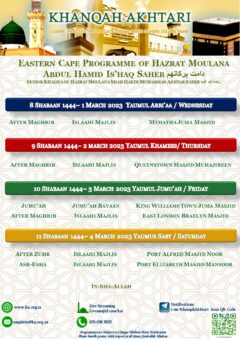Comprehensive Sex Education And Islamic Morality
The Department of Basic Education in South Africa has rolled out the Comprehensive Sex Education (CSE) curriculum. It was officially unveiled on 23 January 2020. It is a component within the Life Orientation school subject. There are some areas of concern from faith based communities. In this article we wish to unpack some of these concerns as well as morality from an Islamic viewpoint.
When a person plays a game like Monopoly, and becomes proficient at the rules, he can play it without even putting his mind to it. If he is then invited to play another board game, something on a different concept like Catan for example, and he plays with Monopoly rules, he will quite soon discover his style of play is not working out. Islam has rules for not only acts of worship but every aspect of life. If a Muslim tries to superimpose an alien set of rules on his economic, social or justice system, he would soon pick up difficulties in implementation. The same applies to morality.
The values of chastity and modesty are central to a Muslim’s character. He needs to uphold all measures that nurture modesty. In essence, it has to be a comprehensive package deal derived from the fundamentals of Islam.
If a Muslim wants to see the benefits of implementing Islamic morality within his life, he will need to accept and practice upon all associated aspects.
- The Holy Quran speaks about the usage of the eyes and their place within morality: “Tell the believing men that they must lower their gazes and guard their chastity. That would be conducive to their moral purity.” (Quran 24:30). The usage of the eyes is thus linked to moral chastity.
In an environment of other ideologies jostling for our attention, we might tend to take the usage of the eyes as something granted, casually engaging with the opposite gender in this regard. Yet the Islamic viewpoint is reinforced with the Prophet sallallahu alaihi wa sallam’s instructions for example to Jareer ibn Abdullah radhiallahu anhu that a man should turn away his gaze from an accidental look at a female whom it is forbidden to look at.
- The role of guarding the voice so that chastity is maintained within society is outlined in the Quranic injunction to the noble wives of the Prophet sallallahu alaihi wa sallam: “So, do not be too soft in your speech, lest he in whose heart is a disease be moved by desire. And speak in a normal, appropriate, matter-of-fact manner.” (Quran 33:32). Engaging in casual flirting thus has no place within Islamic morality.
- Clothing also forms part of the package deal of morality and chastity. “O children of Adam, We have sent down to you clothing that covers your shame and provides adornment.” (Quran 7:26) Appropriate dressing, and concealment of the body form also plays a role in Islamic morality. This is reinforced with the Quranic instruction for ladies to dress with modesty when emerging from the home into public.
All these instructions serve to highlight the holistic Islamic solution to preserving modesty within society. The underlying aim is keep the process of human procreation pure through which the family structure is reinforced. This is the building block of a healthy society. All of this runs against the grain of the ever evolving societal norms that western culture wishes to pass off as normal.
What does CSE aim to teach?
That I own my body and I choose what to do with it. This negates the fact that a Muslim believes that his body is a trust given by Allah Ta’ala. If adults have shown an inability to govern this aspect, to a greater degree this responsibility cannot be left to minors.
What is behind CSE?
The driving force is a set of concepts which come from ideologies that are influencing modern life as we know it. They are rooted in secular humanism, effectively denying a place for God in our lives. As a result, concerned members of the public should not only concentrate on CSE. It is not an isolated subject but one that ties in with a comprehensive onslaught on societal values that are driven by faith based concepts, including those of Islam.
Some of the potentially problematic areas are the explicit descriptions of relationships, sexual orientation, explicit visuals of body parts, reproduction and contraception. The mindset of the person teaching the subject will also be crucial as his or her values will be imparted.
Government is concerned, and rightfully so, at the increasing rate of teenage pregnancies out of wedlock. Teenage pregnancies account for 8-10 % of all deliveries in South Africa. 3261 girls between the ages of 10-14 became mothers in South Africa in 2019. In order to stem this breakdown in societal structure, government wants to educate learners about sexuality through CSE. CSE aims to equip learners with knowledge, skills, attitudes and values to develop sound social and sexual relationships. The aim is noble, but the problem lies in the fact that the underlying western ideology underpinning the content refuses to acknowledge liberalism and sexual freedom as the root cause of the problem.
In reality, sexual education has been taught in South African schools for some years now, yet the stated objective of lowering HIV, Aids, etc. has glaringly not been achieved. While the aim is laudable, the method used and its associated evils overshadows that. Early exposure to sexually explicit words, pictures and ideas, graphic visual content of sexual relationships, the issue of same gender relations being encouraged, the use of condoms instead of total abstention, and the emphasis on making one’s own decisions rather than being guided by Islamic ones destroys any little good within the idea.
What is our response?
- Due to a host of factors, kids are being brought up in an increasingly sexualized society. So as much as we might approach the topic with dread and embarrassment, it needs to be brought up by parents who can provide the appropriate counterbalance.
- Learn what the curriculum covers so as to be adequately prepared. Educating oneself with what is actually in CSE will ensure our response is informed, and will give us an appreciation of the possible areas of concern.
- Approach your child’s school and enquire about their policies in this regard.
- Do not feel overwhelmed or that we cannot make an impact. By making their voices heard, faith based groups in the UK ensured that implementation was not a walk over by government.
- The Islamic values need to be taught so that kids will have a reference point when exposed to conflicting values.
- We need to assess our practical levels of modesty. The way we act in this regard informs our kid’s outlook to a significant degree.
- Arrange faith based initiatives to engage with public schools to impart common values of morality to learners.
While the challenges are great, a collective effort is required by the community as a whole in the upbringing of our youth. It takes a community to raise a child. If we have not yet read up on CSE, how will we even realise that there is a danger? In fact, if we are not apprehensive at the impact of CSE we are already on the back foot.











COMMENTS